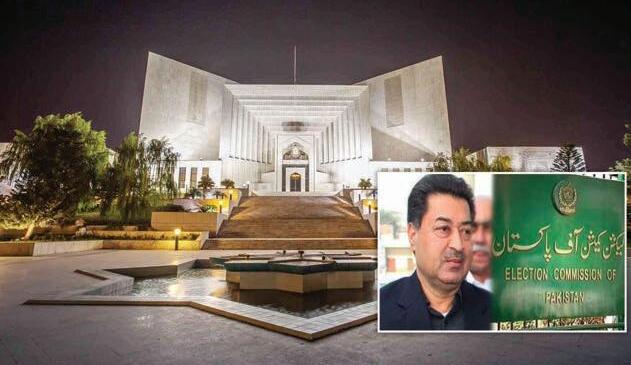Supreme Court to take up PTI plea seeking contempt proceedings against ECP on Wednesday
ISLAMABAD ( Web News )
A three-member bench of the Supreme Court of Pakistan will hear a petition filed by the Pakistan Tehreek-e-Insaf (PTI) seeking contempt of court proceedings against the Election Commission of Pakistan (ECP) on Wednesday (3rd January) over “failure to provide a level-playing field” ahead of general elections — scheduled to be held on February 8.
Three-member bench of the Supreme Court headed by Chief Justice of Pakistan Justice Qazi Faez Isa and comprising Justice Muhammad Ali Mazhar and Justice Musarrat Hilali will hear the PTI petition.
During the hearing of the cases on Monday, PTI leader Shoaib Shaheen Advocate appeared before the CJP-led bench and requested for half a minute time to say something. Chief justice permitted Shoaib Shaheen to speak. Shoaib Shaheen argued that the Supreme Court had issued the order regarding the elections. Upon this chief justice stopped him and asked him to sit and the court will hear him later on. However during the break, Shoaib Shaheen left for Islamabad High Court and did not return till the bench completed hearing of all 10 cases fixed for Monday.
After the judges left the courtroom, Shoaib Shaheen returned back and requested the PS of the chief justice either to hear the case immediately or grant time for meeting. Later on the chief justice has fixed the case for hearing on Wednesday (3rd January).
It is worth mentioning here that on December 22, the Imran Khan-led party had moved the apex court seeking orders for the election commission to ensure a level-playing field.
A three-member bench comprising acting chief justice Sardar Tariq Masood, Justice Syed Mansoor Ali Shah and Justice Athar Minallah had heard the petition.
During the hearing, Justice Minallah observed that the political party’s allegations of denial of the level-playing field were “prima facie correct”.
The top court had directed the ECP representative to meet the PTI counsels to address the party’s concerns regarding the level-playing field besides ordering the attorney general to assist the poll organising authority in the meeting.
The party had filed another petition on December 26, seeking contempt of court proceedings against the ECP over the electoral body’s alleged failure to ensure the level-playing field.
In its petition, it lamented the top electoral body’s failure to implement the apex court’s directions — despite being notified by the Punjab ECP — wherein it had ordered the poll organising authority to address the PTI’s concerns about the absence of a level-playing field.
The application referred to the top court’s ruling, in response to the PTI’s petition filed under Article 184(3) of the Constitution complaining of being denied equal opportunities in the political arena, where it directed the electoral body to meet with the party’s representatives and address its relevant concerns.
The party, in its recent application, contends that the ECP secretary failed to abide by the apex court’s December 22 verdict as PTI candidates continued to be harassed and arrested even after the top court’s ruling.
Furthermore, the plea — which mentions the ECP and interior secretaries as parties to the case along with the Inspector General Police (IGPs) of all four provinces — also levels serious allegations against the Punjab IG, labelling him as the “mastermind” behind the crackdown against the PTI.
Seeking action against those responsible for violating the court’s order, the party had prayed to the court to ensure that its candidates are allowed to hold rallies and political gatherings — as part of a level-playing field ahead of the polls.
The PTI is not the first party to complain of the lack of a level-playing field — a term used widely to lament the absence of equal opportunities for stakeholders — as Pakistan Peoples Party (PPP) and Pakistan Muslim League-Nawaz (PML-N) have also voiced concerns on the said issue on multiple occasions.

